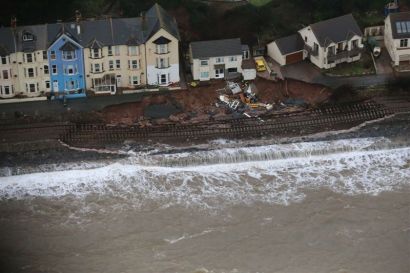CLOSURE of the only main line through Devon into Cornwall, caused by ferocious seas damaging at least 80 metres of the sea wall and track at Dawlish and the local station, has become a political controversy in South West England. And HS2 opponents have joined the furore, arguing money should be spent on improving existing lines instead.
Now three members of the House of Lords have written to Transport Minister Baroness Kramer “urging her to instruct Network Rail to undertake a major study with Government and business and local authorities to investigate alternative inland route(s) for the main and only railway line serving Exeter, Plymouth, South Devon and Cornwall that will give 100 year resilience to this line.”
Their letter follows expressions of serious concern by council and business leaders in Devon and Cornwall suggesting closure of the line at Dawlish could cost the region up to £20 million a day, or £140 million a week. If repairs take six weeks – the minimum approximate estimate so far given by Network Rail – the cost to the economy could be over £800 million. If repairs take two months, the figure will rise to over £1 billion.
In their letter to Baroness Kramer, Lords Bradshaw, Teverson and Berkeley – who say they have “a strong interest in railways and the South West’s’ economy” – suggest the economic losses “would surely build a diversion line and deal with the floods above Exeter.”
Meanwhile, Transport Secretary Patrick McLoughlin, who pointed out that over £38 billion would be spent on maintaining and enhancing the railway network over the next five years, has asked for an urgent report from Network Rail on possible longer-term alternatives to the present route via Dawlish.
Cornwall Chamber of Commerce chief executive Kim Conchie said that a fraction of the £42 billion High Speed 2 budget spent upon upgrades to the West Country’s rail connection would make “a massive difference.”
Devon and Cornwall Business Council leader Tim Jones said: “This has been an accident waiting to happen and we’ve been banging on about it for 20 years. The answer is for the Government to throw enough money at it so it doesn’t happen again – very little compared to HS2.”
Toby Parkins said: “In my role as president of Cornwall Chamber we are meeting the transport minister in March to review and reinforce the issues and I’m hoping to take as many stories from as many businesses as possible to that meeting so we can present the weight of the problem to him in no uncertain terms.”
MPs have also demanded urgent action. St. Ives MP Andrew George has challenged Prime Minister David Cameron to spend money on improving the line between Exeter and Penzance before spending money on HS2. And Exeter Labour MP Ben Bradshaw made a similar call.
The HS2 Action Alliance – which opposes the Government’s HS2 plans and recently lost its appeal against the project in the Supreme Court – claimed the cost of HS2 would be better spent on improving existing railway infrastructure. The Local Campaigns Director for HS2AA, Peter Chegwyn, said the recent bad weather had shown how vulnerable the Cornish main line is to severe bad weather.
“How can we even think about wasting £50 billion on HS2 when Brunel’s great railway line at Dawlish is washed into the sea?” he asked. “We urgently need to spend money on updating and improving the existing network which is hanging on by the skin of its teeth. Cornwall and Devon now face being cut off for six weeks – just so that a few people can get to Birmingham more quickly.
“There’s a strong case for re-directing some of the £50 billion earmarked for the HS2 high-speed rail project. Why not spend a bit of it on re-opening the whole of the alternative route via Okehampton that was axed by Beeching?” said Mr Chegwyn.
“The HS2 Action Alliance is calling on all West Country MPs to lobby the Government for money to be spent on improving existing rail lines instead of on a £50 billion HS2 vanity project that has no benefit to the West Country.”
Network Rail said full assessment of repairs necessary at Dawlish “will come with calmer weather after the weekend, along with a revised timescale. Initial estimates are that it will be at least six weeks to completion from when work begins.”
A concrete spraying machine, which was used during the recent work to refurbish Whiteball tunnel between Taunton and Exeter, will begin later today (7 February) building up a layer of material over the subsoil exposed by the collapsed sea wall.
“This will be a sacrificial layer, to absorb some of the force of the storm forecast for tomorrow,” said Network Rail.
Work is also continuing to demolish the most-damaged platform at Dawlish station itself, ready for rebuilding.
Network Rail said it has mobilised a range of specialist contractors, engineers and suppliers from across the country to help with the work needed at Dawlish and has also taken up the offer of discussions with the Ministry of Defence to see if there is any help which can be provided by armed forces personnel based in the south-west.
• The Cambrian Coast line between Dovey Junction and Barmouth, which has been closed for several weeks due to storm damage, is due to re-open next week, Network Rail said – subject to the storms forecast for the coming weekend. But the rest of the line to Pwllheli is not due to repaired until mid-May.
•• The line between Dorking and Horsham, closed a month ago by a landslip at Ockley, has been re-opened five days ahead of schedule. More than 4,000 tonnes of material have been used to repair the collapsed embankment.


